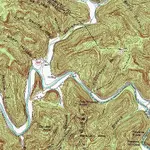Here is a section of an article I was reading today. Remember this was several years before Boone blazed the trail through Cumberland gap.
The first migrants to cross the Appalachians soon discovered that the mountains were not the only obstacles to westward settlement. Other factors were the Native-American inhabitants and the ongoing dispute between the British and French governments as to who controlled this area. As such, the migrations of British colonists beyond the mountains was a principal cause of the French and Indian War (1754-1761).
After the war, migrants crossed the mountains in increasing numbers despite the British government's 1763 proclamation prohibiting settlement beyond the Appalachians. The British knew if the colonials continued their unrestrained encroachment upon Indian territory another Indian war would ensue, a situation they hoped to avoid. However, neither government prohibitions nor army blockades could stop the deluge of settlers that poured west after 1765. Separated by mountain ranges and hundreds of miles from the center of political authority in the East, migrants such as Daniel Boone, and John Sevier followed their own designs and ignored government policies that they deemed to be inconsistent with their interests. Other routes through the Appalachians were also discovered during this time, including the Cumberland Gap, which afforded migrants access to eastern Kentucky and Tennessee.
The 1763 proclamation didn't amount to nothing according to this article. People went exploring and looking for a new place to settle any how.





